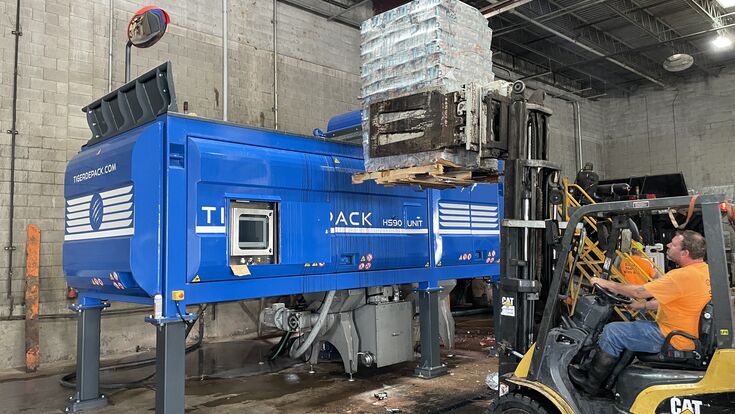Biowaste contamination : Efficiently separating non-organic materials from compostable inputs

Every compost facility operator knows that it’s not only perfectly separated organic waste that ends up in the composting plant. Various waste streams also need actual depackaging: biowaste generated by a multitude of sources such as roadside collection, markets, and large-scale retailers as well as from stations, ports, and airports that is contained in either plastic, metal or cardboard packaging. Or faulty or expired products like cosmetics and detergents. The Tiger Depack offers a solution to this problem. It has been developed for the recovery of packaged products, production waste, and organic matrices. It is designed to process both segregated biowaste and expired packaged food, or simply to clean up recyclables before they are removed.
Patrick Gerarty, founder of US company St. Louis Composting, talks about the challenges faced by composters and how his company goes about minimizing contamination with the help of special equipment.
Could you give us an overview of your company and composting facilities?
Founded in 1992 by eco-enthusiast Patrick Geraty, St. Louis Composting is the region’s largest compost producer. Together, our nine composting facilities process over 1,000,000 cubic yards of green material annually—more than half of all yard waste generated in St. Louis County. In addition to composting yard trimmings gathered by the area’s major waste haulers, we receive and compost material collected from landscapers and homeowners. We transport and process over 300 tons of organic food waste each week, keeping our landfills free of this organic debris.
Where are the facilities located?
Our nine facilities are located throughout the St. Louis Metro area. Our depackaging facility is located in downtown St. Louis.
What sort of organic waste do you process in your facilities?
We process a wide variety of organic waste in our facilities, ranging from food waste to yard waste. Our depackaging facility handles a variety of items such as canned goods, Tetra Pak cartons, cardboard-packaged foods, plastic-packaged foods, animal feed, contaminated food waste, packaged snacks, and dairy products. After depackaging, these materials are combined with inputs like yard waste, brush, leaves, grass, and even shredded bank notes, all of which are transformed into high-quality compost.

Do you see an increase in the demand for composting? If so, what do you think are the reasons?
Yes, we've seen a marked increase in demand for composting, which can be attributed to growing environmental awareness and the push for sustainability. As people, businesses, and municipalities strive to divert organic waste from landfills, reduce emissions, and embrace green initiatives, composting has become a crucial component of zero-waste programs.
Is contamination a problem in your facilities?
Contamination can be a challenge, especially with mixed waste streams, but we take a proactive approach to minimize it. Our depackaging equipment is designed to efficiently separate non-organic materials from compostable inputs, and our eco-sift machines further refine the compost for quality. We emphasize quality control and continuous education to prevent contamination from becoming a significant issue, ensuring that we consistently produce high-quality compost.
What motivated you to choose the Tiger Depack?
After researching other options, we felt confident in choosing the Tiger Depack due to our established relationship with Ecoverse, the importer of Tiger Depack in the US. Their reputation for quality products assured us that this technology would meet our needs.
How many are in operation and since when?
We have one Tiger Depack that we have been operating since 2016.
Can you describe the new machinery and its key features?
We use the Tiger Depack HS 90 with Dual Organics Discharge System, alongside the 2020 Doppstadt DSP 205 Bio Press with the 2020 Doppstadt Conveyor. These machines are efficient in separating packaging from organics.
How does the new equipment differ from what you were using before?
The new equipment has opened up entirely new opportunities for us, allowing us to start depackaging organics—a process we weren’t involved in before. This capability has significantly expanded the volume of organics we can process, enabling us to divert even more materials from landfills. By separating packaging from organics, we’ve been able to partner with large companies to help them achieve their zero-waste goals, marking a significant step forward in our sustainability efforts.
What training was required for your staff to operate the new machinery?
Ecoverse provided on-site training for our operators, ensuring a smooth transition to the new equipment.
What advice would you give to other composting facilities considering similar investments?
It's essential to understand that unforeseen challenges will arise, so thorough research is crucial. Visiting other facilities that depackage organics and seeing the process firsthand can be incredibly valuable in making informed decisions
In cooperation with Tiger Depack


